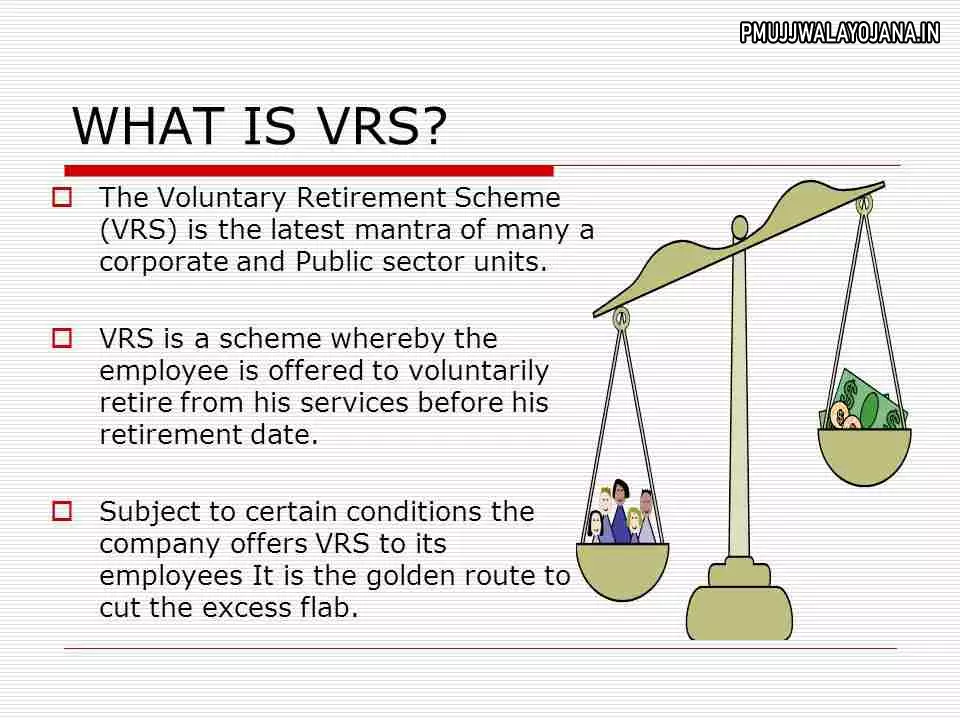Voluntary Retirement Scheme (VRS) is a way for companies to offer employees the chance to retire early, before the usual retirement age. This helps companies cut down on staff and save money. If you want to know everything about VRS, including what it is, who can apply, its benefits, and how it works, keep reading this article carefully.

Overview of Voluntary Retirement Scheme (VRS)
A Voluntary Retirement Scheme lets employees choose to retire early with the company’s approval. It helps companies reduce their staff in a friendly way. Both government and private companies can offer VRS. It’s also called a “golden handshake.”
People working in companies or cooperative societies can opt for VRS. Once you take VRS, you cannot join another company in the same field.AIMS Portal
Main Objective of Voluntary Retirement Scheme
VRS mainly helps companies dealing with financial troubles by lowering their staff costs. It also supports employees with benefits like counseling and financial guidance, making life easier after early retirement. Know to Register on Employment Exchange
VRS Scheme Details for 2025
| Name of scheme | Voluntary Retirement Scheme (VRS) |
| Launched by | Government of India |
| Who it helps | Companies and Employees |
| Goal | Reduce employee numbers to cut company costs |
Main Benefits and Features of Voluntary Retirement Scheme
- Employees can choose to retire before their official retirement date.
- Taking VRS is completely your choice, not forced by the company.
- Only employees who have worked for at least 10 years or are over 40 years old can apply.
- Both government and private companies offer this scheme.
- Also called a golden handshake, as it often comes with a good compensation package.
- Helps companies save money by reducing staff numbers.
- Once you take VRS, you can’t join another company in the same industry.
- Employees get benefits like rehabilitation, counseling, provident fund, and gratuity payments.
- Compensation for VRS can be tax-free up to a certain limit.
Why VRS is Preferred Over Direct Retrenchment
Indian labour laws don’t allow companies to fire employees without a good reason, and workers’ unions often oppose retrenchment. When companies have too many employees and money problems, VRS offers a peaceful way where employees volunteer to leave. This helps avoid conflicts and issues with unions.
When Do Companies Use Voluntary Retirement Scheme?
- When products or technology become outdated
- During company mergers or takeovers
- Joint ventures with foreign companies
- When business faces a recession
- When competition increases strongly
How Is VRS Compensation Calculated?
- Based on your last salary before retirement.
- You get 3 months’ salary for each year you worked, or salary for remaining months till retirement, whichever is less.
- Public sector bank employees may get 45 days’ salary per year of service or salary for remaining period, whichever is lower.
Benefits to Employees Who Choose VRS
- 45 days’ salary for each completed year of work or salary multiplied by remaining months before retirement, whichever is less.
- Full provident fund and gratuity payments.
- Tax-free compensation up to a certain limit.
- Extra benefit packages, counseling, and help for life after retirement.
When Can You Opt For Voluntary Retirement?
- Company faces recession.
- Strong competition in the market.
- Joint ventures with foreign collaborators.
- Takeovers or mergers.
- Outdated products or technology.
VRS Eligibility Criteria
- You should be at least 40 years old to apply.
- You must have completed at least 10 years of service in the company.
- Only regular employees can apply; directors or cooperative society members usually cannot.
What You Get Under Voluntary Retirement Scheme
- 45 days’ salary for each year you worked, or your salary multiplied by remaining months till your normal retirement (whichever is less).
- Full provident fund and gratuity dues.
- Tax-free compensation up to a certain limit following rules.
- Support and benefit packages from the company.
If you want to know more or have questions about the Voluntary Retirement Scheme, feel free to ask in the comments. We are here to help you understand it better.